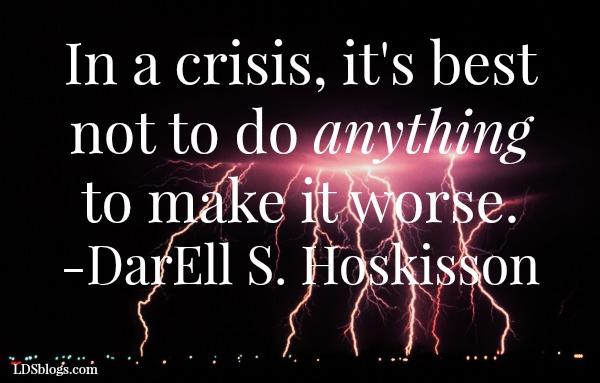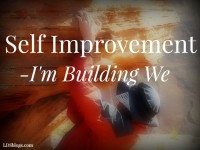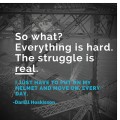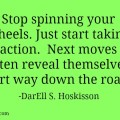The threat becomes clear in a moment, perhaps by a phone call, a letter, or a realization. Ours came in the form of a letter. Our homeowners insurance was dropping us. No big deal, right? But our home was underwater (meaning we owed way more than we could sell it for) and any other insurance was three times as much. We couldn’t afford our house payments with sky high insurance, and we couldn’t sell. We felt trapped. Then, another letter, perhaps a miracle–came in the mail. It promised us amazing interest rates on a refinance. We tried to check it out. They convinced us, and we got caught in a scam that cost us $4,000.00. We never got it back. I often wonder why it has to be so expensive to learn how to weather a crisis.
I have had many expensive lessons. Because I have been scammed, bounced checks, gone to the store for a new stereo TV only to come home with one that had no stereo, slid down a hill on the ice into a bumper and in other ways made bad situations worse, I had to make some rules for myself. I’ll share them with you. Maybe they will save you $4,000.00!
Rule #1: BREATHE
 No matter how bad the news, I think it helps to remember that the truth is not out to get me. In that first moment, I may not even know what the truth is. It is far too easy to jump to conclusions or think immediately of worst case scenarios. The first job is to weather the news.
No matter how bad the news, I think it helps to remember that the truth is not out to get me. In that first moment, I may not even know what the truth is. It is far too easy to jump to conclusions or think immediately of worst case scenarios. The first job is to weather the news.
In a parenting book I read, it pointed out that your first responsibility is to control yourself. If I breathe, handle my own feelings, and think before I try to help my child control himself, we will both be better off. I think that applies to any negative surprise. My first job is to handle my own emotional reaction. Breathe. If there is no time to talk myself through it or talk to a friend, I can at the very least take a deep breath and accept it. I am feeling _______________ right now. That is okay and reasonable because I just found out _______________________. I will work through this _______________________ time. Now, I have to focus on _____________.
When we take a moment to breathe and redirect our thinking, we are taking the time to help our thinking get back in control of our emotional response. When we fell for that scam, we were acting in fear. There was no actual rush to solve the problem (even though sales people always say there is). Try to ascertain how soon decisions must be made, and if they are not immediately urgent.
Rule #2: Don’t Sell Your Car
I had a friend who had PMS symptoms really bad. In her impatience, she almost sold her car. It makes me laugh because I am often the same way. This rule reminds me not to make emotional or impulsive big decisions.
In a crisis, often difficult decisions must be made. Perhaps they need to be made in a very short time. I think difficult, urgent, possibly no-win decisions are a common characteristic of crisis. They aren’t fun, easy, or happy. But even so, unless you are a surgeon in the middle of heart surgery, you probably do have some time to think and evaluate before you decide. Find out how much time you have and use it to:
Rule #3: Think First
 When I’m alarmed, my thinking narrows. I don’t consider asking for help because that would take even more coordination, better thinking than I can muster. I often can only think of two or three not so good options. I usually don’t know what I need or what would help. Since I feel threatened, my defenses go up like a star-ship force field.
When I’m alarmed, my thinking narrows. I don’t consider asking for help because that would take even more coordination, better thinking than I can muster. I often can only think of two or three not so good options. I usually don’t know what I need or what would help. Since I feel threatened, my defenses go up like a star-ship force field.
In times of true life or death urgency, we go into an instinctual response. It is a survival reaction. Luckily, we have learned that this reaction can be trained. If, before the crisis, you took CPR for instance, you might automatically “check the scene for safety” before rushing in to help a victim and avoid becoming a victim yourself. But often we don’t have the specific training we need. Often we have never experienced a situation just like this ever before. In that case, we have to:
Rule #4: Gather Information
We can use whatever time we have, as short as it may be, to gather information to make an informed decision. We want to fully understand the reality we are dealing with. How bad is it really? Is it likely to continue or get worse, or will time help? I have to find out truly:
How much time do I have to choose my response?
What is the root problem?
What is the cause? (if ascertainable)
What are the options?
As embarrassing and sad as our situation might be, we are blessed to be surrounded by others who have learned from similar experience or have made a life mission or career out of helping others in that situation. If you can,
Rule #5: Get expert advice and help from people you know you can trust
Yesterday I was in a cancer treatment center surrounded by people who are weathering cancer. They were brave and amazing. I was struck by the realization that although these people were life-threateningly ill, they looked completely normal. I could walk by one of them on the street and never know. These same people are experts on living through that nightmare. They understand first hand the treatment options and the patience it takes to be a patient. My point is, we are surrounded by experts. No one is alone. We can talk to people and let others help. Ask for help or hire it. If you let someone make your day, it might brighten theirs, too.
Unfortunately, it seems we are also surrounded by vultures. I find it interesting that we have never had a letter in the mail about refinancing before or since. How did they know we would be ripe for scamming? The national housing crash might have made us a statistical target, but since then, I’ve decided to:
Rule #6: Contact professional help directly and with trusted referrals
 We don’t have to deal with people or companies no one has heard of. With social media we can find a friend of a friend in almost any profession. If I had called a company to refinance (something I ultimately did) instead of responding to an advertisement, I would have worked with a legitimate company and with people I could talk to in person.
We don’t have to deal with people or companies no one has heard of. With social media we can find a friend of a friend in almost any profession. If I had called a company to refinance (something I ultimately did) instead of responding to an advertisement, I would have worked with a legitimate company and with people I could talk to in person.
Finally, although we can stay up for two or three days running on adrenaline with little or no food or sleep, it isn’t safe or healthy. So my last rule is:
Rule #7: Drink enough, eat something and take breaks
If you don’t have time to eat anything, you can at least drink something. Friends who don’t know what to do can bring you a smoothie or milk or juice. We can live a week or more without food, but we literally have to have water to survive. Drinking is not optional.
Eat something? Although your stomach may be in knots, if you don’t eat anything your energy and thinking ability will be lower just when you need it most. Maybe you can’t sit down or eat a healthy meal, but at least eat something. Again, if you can’t think how your friends can help, maybe ask them to drop something by.
Take breaks. That is the most counter-intuitive suggestion of all. If there is not enough time, you don’t make more time by wasting it. And, it may literally be impossible to do. In that case, go back to number one–breathe and try to calm your mind during it. But if you can give yourself breaks, you will endure better and longer and be able to think more clearly.
The military has found that short rest breaks improve endurance and overall performance. Ten minute “power naps” (naps under 30 minutes) have been proven to relieve stress and help people cope without making them more groggy. It is a risk to let yourself completely unwind and sleep for a few minutes. What if you nod off and wake up 12 hours later? But maybe you can take turns or set 3 alarms or do whatever you can to take a break. You could test the idea and see if it works for you. Most likely you will be in almost the identical situation ten minutes later but feel refreshed and more able to face whatever has to be done or dealt with.
The point of all the rules is the same. It simplifies into one, easy sounding suggestion:
Don’t do anything to make it worse.
May you
have the presence of mind
to avoid making it worse
and by so doing
endure it well.
Namaste,
DarEll S. Hoskisson
About DarEll Hoskisson
DarEll S. Hoskisson loves to do hard things, but not too hard. She shares her own challenges, goals and experiences as she guides you into a realistic path of self-reflection and self-improvement. She shares tips on how to find, know and trust yourself so you can decide if other’s suggestions are right for you.
DarEll has the world a little upside down—where work is play and play is work. She actually thinks other people’s problems are fun to try to solve and lights up with a personal challenge. She loves people, harmony, and excellence. She also loves useful things like tools and ideas that make work faster, easier and more fun.
DarEll married in 1993 and graduated from BYU (1995) with a bachelor’s degree in English and Secondary Education. Since then she was adopted by 5 children and has worked with many non-profits. She is currently a certified personal trainer and group fitness instructor—leading pilates and yoga at her local YMCA.
DarEll lives in Florida where she enjoys her family, nature, her work, and encouraging people to live well.
She periodically posts her poems, what she is learning, and service opportunities on her personal blogs:
https://personalabridgements.wordpress.com and https://darellhoskisson.wordpress.com
Twitter •








Wow! Excellent advice! I am going to try and memorize them! breathe!
Thanks. I love if what I write is helpful to anyone. “When in doubt, don’t freak out.” 🙂 DSH